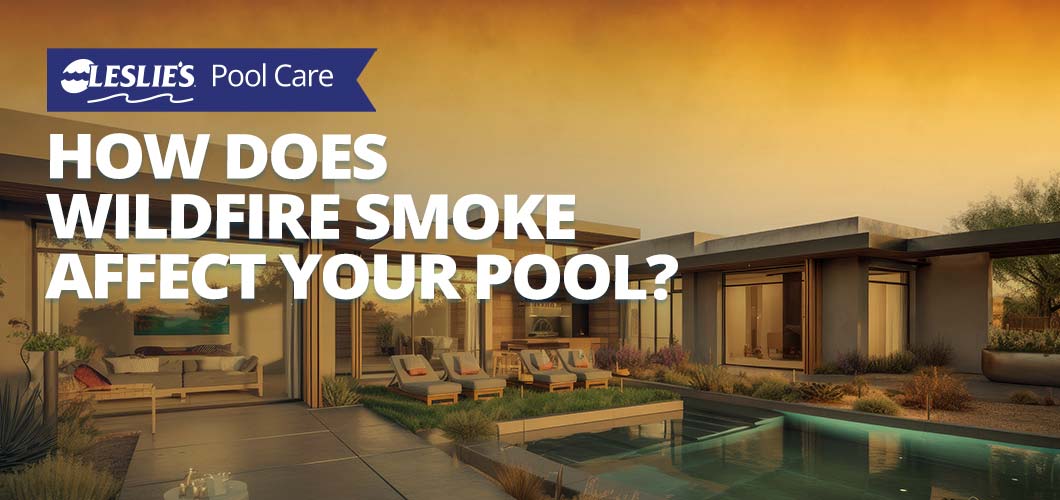
How Does Wildfire Smoke Affect Your Pool?
Even if you don’t live in an area affected by wildfires, dense layers of drifting smoke from nearby fires can have a significant impact on air quality. If you find yourself in the path of a thick cloud of smoke, take care of yourself first and foremost. Avoid going outdoors as much as possible to avoid smoke inhalation and exposure to hazardous air pollutants. But aside from the human health hazards of wildfire smoke, did you know that smoke can impact your pool’s health, as well? Air pollution can affect your pool water in many ways. If you find yourself dealing with poor air quality caused by excessive smoke pollution, here’s what you can do to protect your swimming pool:
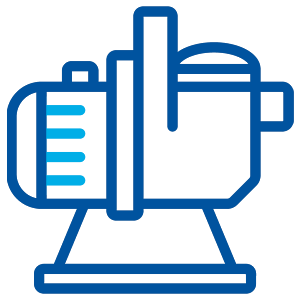
Run the filter pump until the smoky conditions have passed.
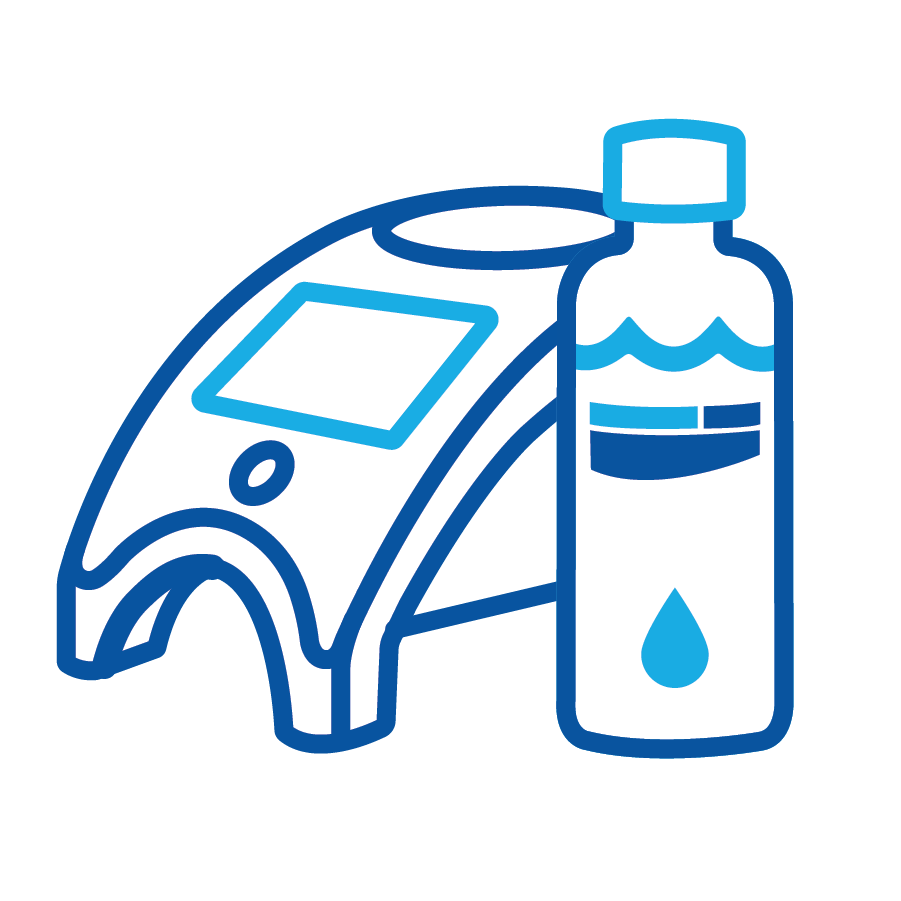
Test, balance, and shock your water to correct issues caused by the smoke.

Add specialty chemicals to expedite pool water recovery efforts.

Clean the pool filter as needed to maintain clean and clear water.
Run the Pool Filter Pump
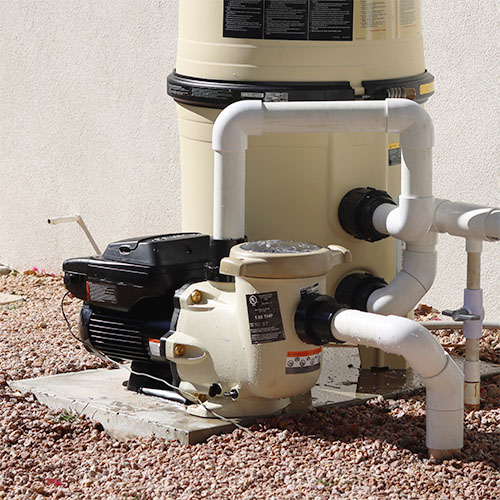
Under ordinary circumstances, you normally run your pool pump for a set amount of time each day to provide sufficient circulation and filtration. However, if there’s a heavy cloud of smoke hanging over your swimming pool, it may be leaving things behind in the water. Until the smoke and air pollution has moved on, it’s important to run your filter pump 24/7 to stay ahead of your pool’s filtration and circulation needs. When faced with smoky conditions, it's a good idea to go ahead and clean your pool filter to avoid placing too much strain on the pump as it runs. More on that below.
Another benefit of running the pump is that it will also help distribute chemicals throughout the pool, which brings us to our next point…
Test, Balance, and Shock Your Pool Water
Smoke pollution carries all sorts of microscopic particles in its soot and ash, including both organic and inorganic compounds. As the smoke hovers around your pool, it can leave behind nitrates, phosphates, ammonia, and other compounds in your pool water. All of these can have a major impact on water chemistry and sanitizer levels.
Test your water
Before you do anything, it's important to test your water so you know the right steps to take. We highly recommend getting your water professionally tested to more precisely measure all aspects of pool chemistry — including phosphates. Leslie’s offers a free in-store AccuBlue® water test to help you analyze 10 different water chemistry metrics, and we also provide you with a complimentary water treatment plan customized according to your test results. Alternatively, you can use at-home test kits or test strips to measure key elements like pH and Free Available Chlorine levels, but these tests aren't as comprehensive and leave more room for error.
PRO TIP: Phosphates can only be measured accurately if your Free Available Chlorine level is below 5 parts per million (ppm).
Balance the water chemistry
Water balance plays a key role in the health of your pool. For example, a high pH (above 7.6) reduces the efficacy of chlorine, while a low pH (below 7.4) can cause chlorine to dissipate more quickly than normal. An imbalanced pH can also cause other issues like cloudy water, stains and scale, and corrosion to pool surfaces and equipment. Since smoky residues are most often acidic and will bring your pH level down, you can use a pH increaser like Leslie’s Soda Ash to bring the levels back up again. However, certain smoky compounds from plant material will actually raise pH — use either Dry Acid or Muriatic Acid to lower pH and bring it back into balance.
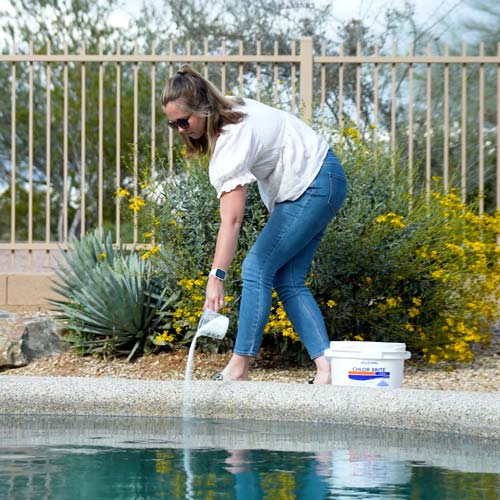
Shock the pool
In addition to causing changes in water chemistry, the influx of contaminants and nitrogen-based compounds like ammonia will quickly use up Free Available Chlorine. If you test your water during and after the heavy smoke pollution has passed, you may notice your chlorine levels are low or nonexistent.
If that’s the case, we recommend superchlorinating your water with a quality chlorine pool shock according to product label instructions. Not only will this boost Free Available Chlorine levels to keep the water sanitized, but it will also eliminate the contaminants causing the high chlorine demand. When necessary, you may need to raise chlorine levels for 24–48 hours to address all the contaminants in the water.
Add Specialty Water Treatment Chemicals
As we mentioned earlier, wildfire smoke can add all sorts of things to the water, including phosphates, fine soot, and organic debris. Adding a few specialty chemicals to the water can help expedite your pool recovery efforts and prevent bigger problems.
Phosphate removers
Phosphates are a primary food source for algae. The lower the level, the less likely algae will take over your pool. If your water test results show phosphate levels above 100 parts per billion (ppb), you’ll need to use a product like Leslie’s noPHOS to get them back under control. Once the level is below this threshold, using a weekly maintenance product like Leslie’s Perfect Weekly can help keep phosphates in check. Perfect Weekly also contains enzymes, which can help with the cleanup effort.
Enzymes
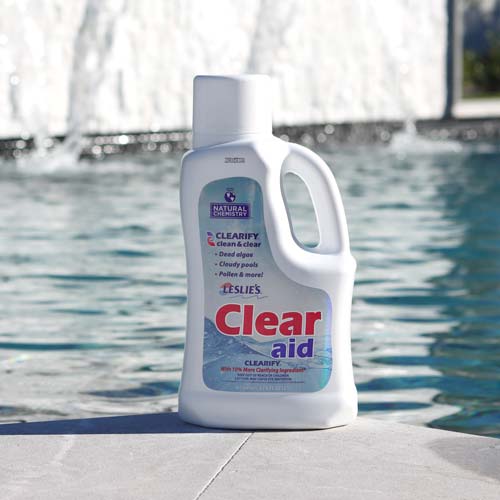
Enzymes work by targeting non-living organic contaminants in your pool water. They come in handy during high-contamination events, like a pool party, rainstorm, or — you guessed it — smoke pollution from a wildfire. Enzymes can help you recover the pool more quickly, and will keep your chlorine working as efficiently as possible. Just remember that chlorine levels must be below 5 ppm when using enzymes, or the chlorine will attack the enzymes instead of the contaminants.
If you want a broad-spectrum enzyme treatment for your pool, we suggest using a product like Pool Perfect. However, if you’re also dealing with cloudy water issues caused by fine, ashy debris, you may be better off using a combination treatment that contains both enzymes and a water clarifier, such as Leslie’s Clear Aid. This brings us to our final water treatment recommendation: clarifiers.
Clarifiers
Running your filter pump 24/7 will ensure your pool stays well circulated and filtered. However, the fine soot and ash brought in by hovering smoke can bypass the filter and lead to cloudy water issues. To remove this debris, we recommend using a water clarifier, such as Leslie’s Ultra Bright Advanced or the enzyme combo Leslie’s Clear Aid. Clarifiers work by clumping fine debris together into larger groups so they can be more easily trapped and removed by your pool filter.
PRO TIP: When adding any chemicals to your water, it’s important to always read and follow all product label instructions. Keep the pump running on high speed to help distribute the chemicals throughout the pool. Most chemicals require you to wait at least 4 hours between product applications to avoid accidentally mixing different chemicals. The product label instructions will provide the most accurate details on proper handling and dosage instructions.
Clean the Pool Filter
In cases of heavy smoke around the pool, all the soot, ash, and other debris can quickly fill up your pool filter as you work to recover the water — especially when running the pump 24 hours a day. Clarifiers will also increase the frequency of cleaning your filter, as they’ll help your filter trap all the extra-fine debris left behind in the water. As mentioned earlier, we highly recommend cleaning your filter early in the pool recovery process. To keep your filter working efficiently, keep an eye on the pressure gauge and backwash or clean your filter whenever it reads 8–10 psi over the starting “clean” pressure or according to the manufacturer’s recommendations.
Follow-Up Pool Recovery Tips for Wildfire Smoke and Debris
If the smoky haze carries a lot of soot and ash into your water, you’ll need to take a few additional steps to prevent pool problems. Settled debris can cause severe staining in your pool, and debris suspended in the water can cause issues with filtration. Be sure to check out our Resource Center article for tips on how to remove soot and ash from your pool.
Test your water more often than usual in the days following the smoky haze to keep an eye on water balance and sanitizer levels. In addition, keep your filter pump running 24/7 to ensure adequate circulation and filtration. If you have questions, or if you notice a problem with your pool, bring a water sample to your local Leslie’s for a free in-store AccuBlue water test and a customized water treatment plan from our experts.